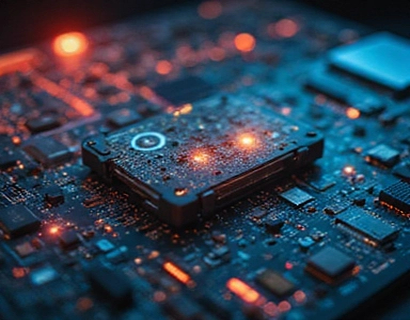AI and Crypto: Pioneering the Future of Digital Finance with Intelligent Solutions
The intersection of artificial intelligence (AI) and cryptocurrency is giving birth to a new era in digital finance, one that promises unparalleled efficiency, security, and user experience. This transformative synergy is not just a buzzword but a tangible shift in how we perceive and interact with financial systems. As tech enthusiasts and innovators, understanding this convergence is crucial for anyone looking to stay ahead in the rapidly evolving landscape of FinTech.
The integration of AI into cryptocurrency is multifaceted, impacting various aspects from trading and security to user experience and regulatory compliance. This article delves into the key areas where AI is making a significant impact, exploring how these intelligent solutions are redefining the future of digital finance.
Enhanced Trading Strategies
One of the most visible applications of AI in cryptocurrency is in trading strategies. Traditional trading relies heavily on human analysis and decision-making, which can be limited by cognitive biases and the inability to process vast amounts of data in real-time. AI algorithms, however, can analyze market trends, news sentiment, and historical data to predict price movements with a level of precision and speed unattainable by humans.
These AI-driven trading bots operate 24/7, executing trades based on predefined parameters and continuously learning from market data. This not only increases the efficiency of trading but also reduces emotional decision-making, a common pitfall for human traders. For instance, machine learning models can identify patterns and anomalies in market data, enabling more accurate forecasting and risk management.
Moreover, AI can facilitate algorithmic trading, where strategies are automated and executed without human intervention. This is particularly beneficial in high-frequency trading, where milliseconds can make a significant difference. By leveraging AI, traders can capitalize on fleeting opportunities that would otherwise be missed, thereby enhancing their overall returns.
Improved Security Measures
Security is a paramount concern in the cryptocurrency space, and AI is playing a pivotal role in bolstering it. Traditional security methods, such as firewalls and encryption, are being augmented with AI-driven solutions that can detect and respond to threats in real-time. Machine learning algorithms can analyze vast amounts of data to identify unusual patterns or behaviors that may indicate a security breach.
For example, AI can monitor transaction patterns and user activities to detect potential fraud or unauthorized access. By learning from past incidents, these systems become more adept at recognizing and mitigating threats, providing a dynamic and adaptive security layer. This is particularly important given the increasing sophistication of cyber-attacks targeting cryptocurrency exchanges and wallets.
Additionally, AI can enhance the security of private keys and wallet management. Biometric authentication, powered by AI, can offer a more secure and convenient way to access digital assets. Voice recognition, facial recognition, and even behavioral biometrics are being integrated to ensure that only authorized users can access sensitive information.
Personalized User Experiences
The user experience in cryptocurrency is being revolutionized through AI-driven personalization. Platforms can leverage AI to understand user preferences, behavior, and needs, tailoring services to provide a more intuitive and user-friendly experience. For instance, AI can analyze a user's trading history and risk tolerance to recommend customized investment strategies or asset allocations.
Chatbots powered by natural language processing (NLP) can offer real-time support and guidance, answering queries and providing insights in a conversational manner. This not only enhances user satisfaction but also reduces the burden on human support teams, allowing them to focus on more complex issues. Personalized news feeds and market updates can keep users informed about relevant developments, helping them make more informed decisions.
Furthermore, AI can optimize the user interface and experience based on individual preferences and usage patterns. By continuously learning from user interactions, these systems can adapt and improve over time, ensuring that the platform remains user-centric and efficient.
Regulatory Compliance and Transparency
The regulatory landscape for cryptocurrency is complex and evolving, with governments and financial institutions worldwide grappling with how to oversee these decentralized assets. AI is aiding in navigating this regulatory maze by providing tools for compliance and transparency. AI-driven systems can monitor transactions and user activities to ensure adherence to regulatory requirements, flagging any suspicious behavior or potential violations.
Smart contracts, self-executing contracts with the terms directly written into code, can be enhanced with AI to ensure compliance with regulatory standards. These contracts can automatically enforce rules and conditions, reducing the risk of non-compliance. AI can also assist in generating detailed reports and audits, providing clear and transparent records of transactions and operations.
Moreover, AI can help in the Know Your Customer (KYC) and Anti-Money Laundering (AML) processes by analyzing large datasets to verify identities and detect fraudulent activities. This not only streamlines the onboarding process but also enhances the overall security and trustworthiness of cryptocurrency platforms.
Innovative Financial Products
The combination of AI and cryptocurrency is also giving rise to innovative financial products that were previously unimaginable. Decentralized Finance (DeFi) is one such area where AI is making significant inroads. DeFi platforms leverage blockchain technology to offer a range of financial services, from lending and borrowing to yield farming and insurance, all without intermediaries.
AI can enhance DeFi by providing sophisticated risk assessment tools, optimizing lending algorithms, and personalizing financial products to meet individual needs. For example, AI-driven lending platforms can evaluate creditworthiness more accurately by analyzing a broader set of data points, including blockchain-based transaction history and social media activity.
Stablecoins, cryptocurrencies designed to maintain a stable value, can also benefit from AI. AI algorithms can monitor market conditions and adjust the supply of stablecoins to maintain price stability, reducing volatility and enhancing their utility as a store of value and medium of exchange.
Challenges and Considerations
While the integration of AI and cryptocurrency offers numerous benefits, it also presents several challenges that need to be addressed. One of the primary concerns is the ethical use of AI, particularly in terms of data privacy and algorithmic bias. Ensuring that AI systems are transparent, fair, and respect user privacy is crucial for building trust and adoption.
Another challenge is the technical complexity involved in developing and maintaining AI-driven solutions. The cryptocurrency space is already known for its technical intricacies, and adding AI to the mix requires a high level of expertise. This can create barriers to entry for smaller players and increase the risk of errors or vulnerabilities.
Regulatory uncertainty remains a significant hurdle as well. As AI and cryptocurrency continue to evolve, regulators are still catching up, leading to a patchwork of rules and guidelines. This can create legal risks and hinder innovation. It is essential for stakeholders to engage with regulators to develop clear and supportive frameworks that foster growth while ensuring safety and compliance.
Conclusion
The convergence of AI and cryptocurrency is ushering in a new era of digital finance, characterized by enhanced efficiency, security, and user experience. From advanced trading strategies and robust security measures to personalized services and innovative financial products, the potential applications are vast and promising. However, to fully realize this potential, it is crucial to address the associated challenges and ensure that the integration of these technologies is done responsibly and ethically.
As we move forward, the collaboration between AI and cryptocurrency will continue to shape the future of finance, offering exciting opportunities for tech enthusiasts and innovators alike. By staying informed and adaptable, we can navigate this evolving landscape and harness the power of intelligent solutions to build a more secure, efficient, and inclusive financial ecosystem.










































